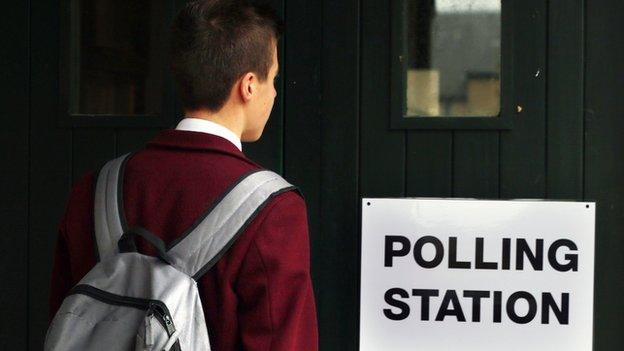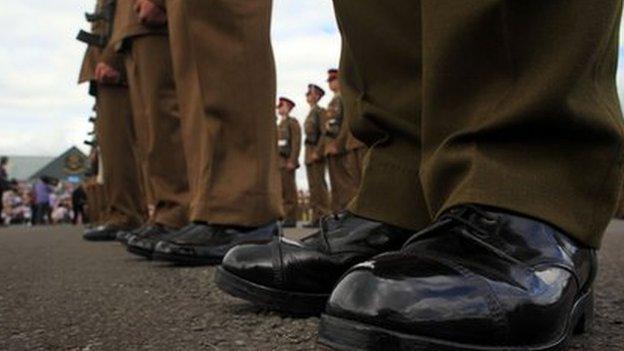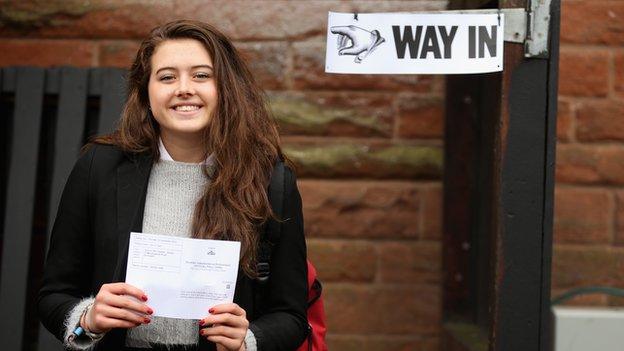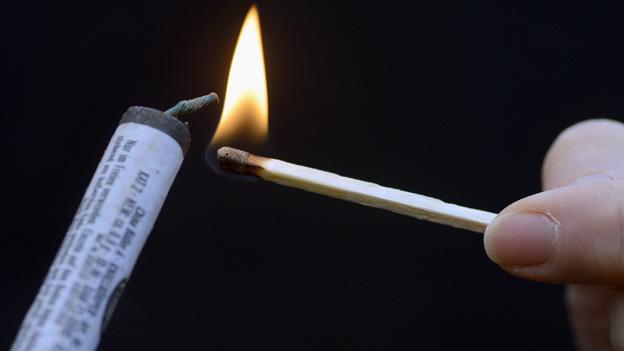Should 16-year-olds get the vote following referendum?
- Published

More than 100,000 teenagers registered to vote in the Scottish referendum
Scottish First Minister Alex Salmond has called for the voting age in UK elections to be lowered to 16 by the 2015 general election. Labour leader Ed Miliband has said his party would give all 16 and 17-year-olds the vote. So should the voting age be lowered?
Speaking in the Scottish parliament for the first time since Scotland rejected independence, Mr Salmond said 16 and 17-year-olds had shown themselves to be "serious, passionate and committed citizens" in the referendum and there was an "overwhelming, unanswerable" case for giving them the vote in all future elections in Scotland and across the UK.
"There is not a shred of evidence for arguing now that 16 and 17-year-olds should not be allowed to vote.
"All parties in parliament should make a vow to urge Westminster to make it happen in time for the next general election," he said.
Speaking at the Labour conference, Mr Miliband also addressed the issue, saying: "It's time to hear the voice of young people in our politics." He pledged to give 16 and 17-year-olds the vote if elected.
There has been a long-standing debate on lowering the voting age to 16 - which would affect more than 1.5 million teenagers in the UK.

Teenagers can join the British army at 16
The Lib Dems promised the change in their 2010 manifesto. The Conservative Party has historically opposed the move.
Proponents of the reduction argue 16-year-olds can live on their own, get married, pay taxes and join the British army.
They point to countries such as Austria, Germany, Norway, Argentina and Brazil where voting at 16 is common practice.
Others argue there has been a generational shift in terms of slowing down the development of young people. People are going to school for longer, joining the workforce at an older age and getting married later.
They also point to figures that suggest turnout tends to be lower among younger voters.

Scottish referendum first-time voter Ivy Hare, aged 17, shows off her polling card
It's too early to know exactly how many 16 and 17-year olds voted in the Scottish referendum.
There were 109,533 youngsters aged 16 and 17 registered to vote - but the number who turned out on the day hasn't been tallied up yet.
Nor do we know how they voted.
A snap poll by Lord Ashcroft the day after the referendum - when Scotland voted against independence by 55% to 45% - found that 71% of that age group voted "Yes". But the sample size was only 14.
There simply isn't any reliable data on how that age group - who were expected to make up about 2.5% of the electorate - voted because surveys that have been conducted so far won't have had a big enough sample size, according to polling expert Prof John Curtice, from Strathclyde University.
However, he says it's not surprising that Mr Salmond has called for change following the referendum.
"If you are looking for evidence to support the supposition that 16-year-olds should vote, you are going to do it when there's a high turnout - and this was the highest turnout in Scottish national history.
"But what would happen in the UK government elections - when turnout is normally about 60% - is debatable," he says.
Dr Jan Eichhorn, from Edinburgh University's School of Social and Political Science, agrees it's too early to take any lessons from the Scottish referendum results.

Fireworks are for sale only to over-18s
But he says there are definitely signs things can be learned from the process.
"There was a suggestion 16 and 17-year-olds would vote differently, be governed by national identity and ideology, but surveys ahead of the vote showed the most important thing to them was exactly the same thing that was most important to adults - the economy," he says.
Some of the other criticisms - that young people would simply copy their parents - also didn't materialise.
"More than 40% of 16 to 17-year-olds had a different view to their parents - young people made up their own minds," he says.
He also credits the 16-year-old vote with increasing engagement among adults. "Young voters learned about the issues at school and went home and talked to their parents - it was dinner-time conversation," he argues.
However, Philip Cowley, professor of parliamentary government at the University of Nottingham, thinks people should be very wary of trying to draw lessons from the Scottish referendum.
"What we had in Scotland was very high-octane, very simple, an existential system where the stakes were incredibly high on both sides. You don't get that in general elections," he says.
He also argues 18 is a "main indicator" in the UK. "You can't buy a firework until you are 18, you can't buy cigarettes until you are 18 - things are being nudged upwards rather than downwards."
Cowley says he understands why it would be "a bit strange" to deny 16 and 17-year-olds a vote in the 2016 Scottish parliament election now, but argues it would be "bizarre" to make a UK-wide decision based on what's going on in Scotland.
"There are 10 times more people in the rest of the UK than Scotland - the momentum is clearly growing but I cannot think of a better example of the tail wagging the dog," he says.